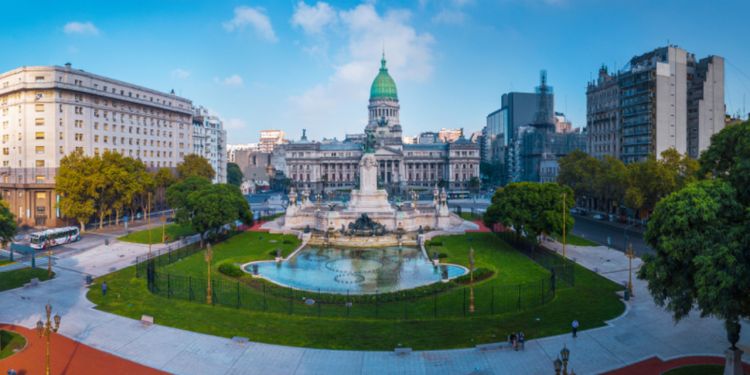
With waterfalls in the north to the Southern Provinces where glaciers calve freely, Argentina has something for everyone -- even the pickiest of travelers. Buenos Aires, the capital city, is a popular destination for expats from around the world, so here are some tips for planning your move if you're looking to make it your new home.
Plan on coming to Buenos Aires? The first stop would be the “Top Ten Apps to Download When Coming to Argentina.”
Touching down in Buenos Aires
The main airport is Ezeiza International, about 35 km south of the city. People from other countries are required to pay a “reciprocity fee” on arrival. The amount depends on what the country of origin charges for Argentines to enter that country.
From Ezeisa, it takes about an hour by remis to get to City Center. One bus line, #8, gets you from the airport to Plaza de Mayo, the centre of all things Buenos Aires.
Getting around Buenos Aires is easy with most of the city laid out in a grid of equal-sized squares. The system reminds most newcomers of Manhattan's grid system. City maps are great to get around the city during the day. With the grid system, it is easy to go almost anywhere on foot and is often faster than taking a taxi.
Buenos Aires has roughly one taxi for about every 80 residents — they are everywhere and easy to hail, regardless of the weather. The exception is when a protest happens — which is almost daily, the subway or bus lines shut down — which happens often.
To hail a cab on the street, watch for cabs with a red light which says “LIBRE” in the windshield. Stand on the right-hand side of the street and select a place where the taxi can safely stop — but not in front of a bus stop.
For better results, until you get used to the system, call a Remis or Radio Taxi or use an app like BA Taxi.
The climate in Buenos
Buenos Aires literally means “good airs” and has a temperate climate. Each of the four seasons is distinct, but extreme heat, or cold, is infrequent.
Winters can get cold, but frosts are rare. Daytime temperatures are mild, and at night a coat can be handy.
Santa Rosa storms typical happen at the end of winter and mark the start of Spring.
Summers tend to be hot and humid, and there are frequent thunderstorms.
According to Servicio Meteorologico Nacional, Winter temperatures hover around 70 to 75 (20°C) but can drop to 2 degrees Celsius. Summer temperatures can range from the low-nineties through the 120s — (40 °C).
Eating out and grocery shopping in Buenos Aires
Restaurants vary from the inexpensive fast foods to fancy and elegant. The price, of course, also varies. For example:
- Meal, Inexpensive Restaurant - ARS$ 300.00-400.00
- Meal for 2 People, Mid-range Restaurant, Three-course - ARS$ 1,100.00-1,500.00
- McMeal at McDonalds (or Equivalent Combo Meal) - ARS$ 280.00-350.00
- Domestic Beer (0.5 liter draught) - ARS$ 70.00-150.00
- Coke/Pepsi (0.33 liter bottle) - ARS$ 40.00-80.00
- Water (0.33 liter bottle) - ARS$ 35.00-60.00
- Cappuccino (regular) - ARS$ 60.00-120.00
Like eating out, groceries also range in prices depending on quality and store location.
- Milk (regular), (1 liter) - ARS$ 40.00-65.00
- Loaf of Fresh White Bread (500g) - ARS$ 50.00-80.00
- Rice (white), (1kg) - ARS$ 30.00-60.00
- Eggs (regular) (12) - ARS$ 50.00-130.0
- Chicken Breasts (Boneless, Skinless), (1kg) - ARS$ 200.00-280.00
The cost of living in Buenos Aires
Asking about the cost of living gets an easy answer — it depends. It depends on your lifestyle, your location and 1001 other factors.
As of September 2019, the cost of living in Buenos Aires ranks 311st out of 374 cities globally.
Typical four-person family month costs range around ARS$ 90,000 — excluding rent, while a single person is looking at around ARS$ 25,000 — again, without the rent. Buenos Aires has a cost of living index of 33.64.
Basic (electricity, heating, cooling, water, garbage) for 85m² Apartment - ARS$ 2,500.00-8,737.95
1 min. of prepaid mobile tariff local (no discounts or plans) - ARS$ 4.00
Internet (60 Mbps or more, unlimited data, cable/ADSL) - ARS$ 1,300.00-2,200.00
Myths about Buenos Aires
Like most major cities, Buenos Aires has its share of myths, and they revolve around safety issues.
Most people coming to Buenos Aires for the first time find the city quite safe and secure. As in any big city, it is best to check with friends or the hotel staff to see if your city-located destination is safe.
Keep your money hidden and take only small amounts of cash with you. Leave your important documents, such as ID or passports in the hotel safe and take copies with you.
There are lots of policia everywhere, but be sure to be street smart and don't carry anything in pocket or purse of great importance or value. If an item is worth anything, leave it somewhere safe before you go walking.
Education in Buenos Aires
The list of schools in Argentina is almost endless and includes both state and private school.
The list of public and private Argentine colleges and universities is almost as endless. Public universities are mainly funded by the state, while private universities require some type of tuition payment.
We do our best to provide accurate and up to date information. However, if you have noticed any inaccuracies in this article, please let us know in the comments section below.






